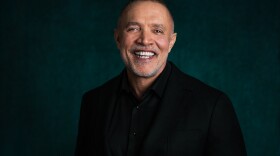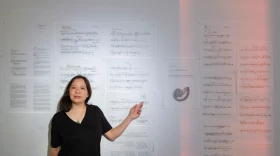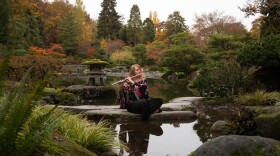Each week, Tyler Kline journeys into new territory and demystifies the music of living composers on Modern Notebook. Listen for a wide variety of exciting music that engages and inspires, along with the stories behind each piece and the latest releases from today’s contemporary classical artists. Discover what’s in store on Modern Notebook, every Sunday night from 8 to 10 on Classical WSMR.
-
On the next Modern Notebook with Tyler Kline: Memories of friendship linger beneath each short movement in Hugi Gudmundsson’s Coniunctio — moments on park benches, in bars, on quiet walks. Composed for cello, the piece unfolds in brief, focused chapters that reflect intimacy through gesture, space, and shared experience.Then: Luciano Berio once described a utopian dream: to build a bridge between folk traditions and modern music-making. In Folk Songs, that vision takes shape through melodies from eight cultures — reimagined not as museum pieces, but as living, breathing connections to everyday life.
-
On the next Modern Notebook with Tyler Kline: Rhythmic collisions, layered textures, and long melodic arcs — Autumn Equinox channels the energy of Sebastian Fagerlund’s opera-in-progress into a charged and expressive octet. Though written as a standalone piece, the music carries the imprint of that larger work: a reflection of seasons changing, and ideas taking new shape.Then: Kevin Puts began his Concerto for Orchestra with a single spark — Amanda Gorman’s poem Hymn for the Hurting, written in response to the tragedy in Uvalde. What follows is a sweeping, multi-movement work of contrasts: chase scenes and music boxes, lyrical interludes and urgent refrains, all voiced by an orchestra pushed to its expressive limits.
-
On the next Modern Notebook with Tyler Kline: Out of conversations and community, a phrase stayed with composer Nicky Sohn: “a fresh breath of hope.” Written for violinist Mary Grace Johnson and inspired by the stories of women rebuilding their lives, this piece becomes a gesture of resilience — breathing color into darkness.Then: In the journals of Canadian painter Emily Carr, composer Tawnie Olson found something familiar: the highs, lows, and quiet intensity of the creative process. Beloved of the Sky sets Carr’s words to music — a choral portrait of solitude, beauty, and the persistence of making art in a world that doesn’t always understand it.
-
On the next Modern Notebook with Tyler Kline: What happens when our obsession with spectacle turns dangerous? Michael Abels’s Nope Suite, drawn from his score written for Jordan Peele’s genre-blending film, rides the line between sci-fi, horror, Western, and family drama — with a score that gallops, pursues, and holds space for both awe and fear.Then: Waves crash, skies open — and the piano becomes a landscape. In Pacific Triptych, Peter Scott Lewis captures the drama and majesty of the Pacific Coast across three movements, with a sense of scale that feels orchestral, even in its quietest moments.
-
On the next Modern Notebook with Tyler Kline: Conrad Tao’s Undone reimagines the myth of Undine — a water spirit who longs for a soul, only to be betrayed and dissolve back into the sea. But in Tao’s telling, she returns not as a victim, but a force — newly powerful, her waves rising higher in a world reshaped by climate change.Then: Written during the pandemic, Chan Ka Nin’s Harp Concerto is a tribute to his mother — a woman losing her memories, but not her strength. Through shimmering harp lines and a quiet inner song, the piece traces her resilience, her love, and the life she continues to carry inside.
-
On the next Modern Notebook with Tyler Kline: Marie A. Douglas’s Tray is both symphonic and cinematic — weaving shifting time signatures, Dorian-mode melodies, and spirituals in clashing tonal centers. It traces the story of Trayvon Martin, from the night of his death through the aftermath of the trial, and honors lives lost to violence rooted in racial injustice.Then: Inspired by the poetry of Emily Dickinson, Anna Murray’s My Little Force Explodes unfolds in fleeting gestures — breath, whisper, and the interplay of voice and flute. It’s music that also draws from Japanese Noh to shape a sound ritual where silence carries as much weight as sound.
-
On the next Modern Notebook with Tyler Kline: In Listen to the Earth, James Grant takes us aboard Apollo 11 — from liftoff, through orbit, all the way to the lunar surface. Drawing from NASA transcripts, environmental texts, and his own poetic reflections, Grant’s music becomes a call to witness our planet’s beauty from space — and to care for it with everything we’ve got.Then: Inspired by a Mark Rothko painting, Anna Clyne’s Color Field imagines sound as color and color as sound — with musical movements tied to yellow, red, and orange. Each section draws from synesthesia and Scriabin’s color-pitch associations, blending warmth, fire, and calm into a vivid, sonic canvas.
-
On the next Modern Notebook with Tyler Kline: With the earth as muse, Colin Jacobsen offers a musical tribute to Ruth Crawford Seeger in his piece A Short While to Be Here… — imagining the voice she might have found had she lived longer. Weaving together folk memories, modernist language, and the fleeting beauty of life on this fragile planet, his piece pulses with reverence for all who come and go.Then: Liza Lim’s cello concerto, A Sutured World, took shape through months of frustration and discovery — an act of sewing together broken fragments to reveal something whole and luminous. Like golden joins in shattered pottery, her music traces the line between damage and healing.
-
On the next Modern Notebook with Tyler Kline: Satoshi Yagisawa’s Clarinet Concerto doesn’t just spotlight the soloist — it weaves them into a vibrant sound world of contrast and color. Intimate, expressive, and thrillingly fast, it’s a standout in today’s wind repertoire.Then: What if a fugue could swing with jazz harmony? Or a Medieval chant twist in on itself through microtonal layers? In Contrapuntal Forms, Juri Seo turns centuries of technique into a living, breathing, and beautifully unruly sonic ecosystem.
-
On the next Modern Notebook with Tyler Kline: Inspired by dance, Daniel Pesca’s Gestures of Grace explores movement in sound — spinning, gliding, and unfolding with a sense of elegance and surprise. It’s a vibrant duo for flute and piano, written as a tribute to a long musical friendship.Then: The double bass takes center stage in Sarah Louise Bassingthwaighte’s Concerto for Double Bass, a sweeping three-movement work that explores sorrow, humor, and catharsis. From haunting harmonics to cheeky pizzicato to a blazing finale, it’s a full-spectrum portrait of sound and feeling.
-
On the next Modern Notebook with Tyler Kline: Field recordings, flowing strings, and blues-infused melodies shape Trevor Weston’s Legacy Works. These reimagined spirituals, from There is a Balm in Gilead to Run to Jesus, blur the lines between tradition and transformation.Then: What does up sound like? D. Riley Nicholson explores the idea from every angle in his piece UP — spiraling up the circle of fifths, building energy, and tumbling through dizzying piano textures that never stop climbing.
-
On the next Modern Notebook with Tyler Kline: Beneath the forest floor, trees and fungi share a secret language — exchanging nutrients through delicate underground pathways. That symbiotic relationship comes to life in Wood Wide Web II by Miriama Young, where marimba and flute trace an imagined conversation between roots and mycelium.Then: Thierry Escaich’s Double Concerto for oboe and violin is a spirited dialogue between friends — rooted in late-night chamber sessions and shared improvisations. At its heart is a shimmering homage to J.S. Bach, with counterpoint that ripples, refracts, and dances between the two soloists.
-
On the next Modern Notebook with Tyler Kline: A tender farewell, a storm of emotion, and a swirl of nostalgia — Isidora Žebeljan’s final work, Three Curious Loves, is a violin concerto that moves from gentle lyricism to wild, virtuosic energy. It’s a deeply intimate piece that feels like memory set to music.Then: Hayden Carruth’s Emergency Haying is a poem about labor — about the hard, physical work of tending land. But composer Libby Larsen saw something deeper: a quiet meditation on injustice, on lives shaped by weather, by price, by need. Her setting of the poem is raw and grounded, like the earth it comes from.
-
On the next Modern Notebook with Tyler Kline: Hear music by Valerie Coleman that embodies the common threads of community and empathy, reminding us that we are one people; a violin and flute duo by Carlos Simon that's stir crazy; and a piece for two saxophones by Katahj Copley called K-R-O-N-O.Then: Hear Lalin by Nathalie Joachim — a piece conceived under the moon and stars on her family’s farm in the Haitian countryside; Sunny X by Tyondai Braxton, continuing his experiments with electronics and live percussionists; and pieces for saxophone by Shelley Washington and Evan Williams.


















